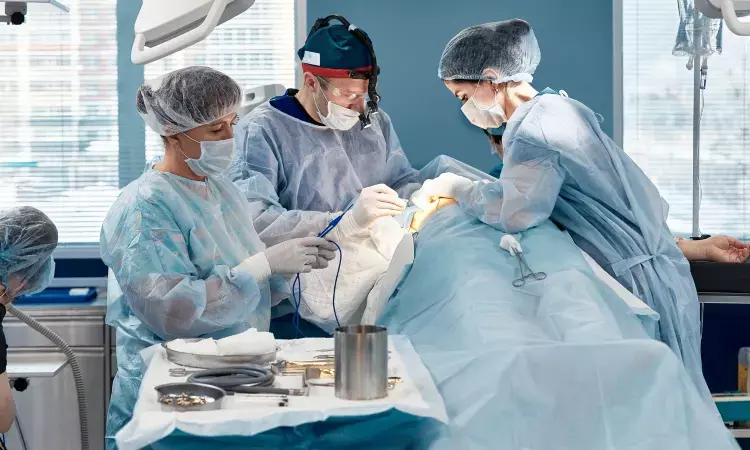- Home
- Medical news & Guidelines
- Anesthesiology
- Cardiology and CTVS
- Critical Care
- Dentistry
- Dermatology
- Diabetes and Endocrinology
- ENT
- Gastroenterology
- Medicine
- Nephrology
- Neurology
- Obstretics-Gynaecology
- Oncology
- Ophthalmology
- Orthopaedics
- Pediatrics-Neonatology
- Psychiatry
- Pulmonology
- Radiology
- Surgery
- Urology
- Laboratory Medicine
- Diet
- Nursing
- Paramedical
- Physiotherapy
- Health news
- Fact Check
- Bone Health Fact Check
- Brain Health Fact Check
- Cancer Related Fact Check
- Child Care Fact Check
- Dental and oral health fact check
- Diabetes and metabolic health fact check
- Diet and Nutrition Fact Check
- Eye and ENT Care Fact Check
- Fitness fact check
- Gut health fact check
- Heart health fact check
- Kidney health fact check
- Medical education fact check
- Men's health fact check
- Respiratory fact check
- Skin and hair care fact check
- Vaccine and Immunization fact check
- Women's health fact check
- AYUSH
- State News
- Andaman and Nicobar Islands
- Andhra Pradesh
- Arunachal Pradesh
- Assam
- Bihar
- Chandigarh
- Chattisgarh
- Dadra and Nagar Haveli
- Daman and Diu
- Delhi
- Goa
- Gujarat
- Haryana
- Himachal Pradesh
- Jammu & Kashmir
- Jharkhand
- Karnataka
- Kerala
- Ladakh
- Lakshadweep
- Madhya Pradesh
- Maharashtra
- Manipur
- Meghalaya
- Mizoram
- Nagaland
- Odisha
- Puducherry
- Punjab
- Rajasthan
- Sikkim
- Tamil Nadu
- Telangana
- Tripura
- Uttar Pradesh
- Uttrakhand
- West Bengal
- Medical Education
- Industry
Transcatheter repair safe and effective among patients with mitral regurgitation secondary to cardiomyopathy: NEJM

William T. Abraham, M.D. added that Patients receiving transcatheter repair of secondary mitral regurgitation have a lower hospitalization rate than those who received medical therapy alone.
This study, "Five-Year Follow-up after Transcatheter Repair of Secondary Mitral Regurgitation", was published in the New England Journal of Medicine.
Researchers said that transcatheter edge-to-edge repair of the mitral valve is safe and effective among patients with a history of heart failure and secondary mitral regurgitation. These findings are for a 2-year follow-up.
Considering longer-term outcomes, data is still scarce and needs more clarification.
This study randomly assigned patients with heart failure and moderate-to-severe or severe secondary mitral regurgitation. Despite using guideline-directed medical therapy at maximum doses, these patients were symptomatic. These patients were assessed for 5-year efficacy and safety of transcatheter edge-to-edge repair.
The study had two groups: a combo of transcatheter edge-to-edge repair plus receive medical therapy as the device group and medical therapy alone as a control group.
The primary endpoint was all hospitalization for heart failure through 2 years of follow-up. After two years, control group patients could receive the device.
The study summary includes the following points:
- Out of 614 patients, the number of patients in the device and control group were 302 and 312, respectively.
- In the device group and control group, the annualized rate of hospitalization for heart failure through 5 years was 33.1% and 57.2% per year, respectively, with a hazard ratio of 0.53. The all-cause mortality through 5 years was 57.3% and 67.2%, respectively, with a hazard ratio of 0.72.
- The percentage of death or hospitalization for heart failure within five years in the device and control groups was 73.6% and 91.5%, respectively.
- Device-specific adverse events were rare and occurred within the first 30 days after the procedure.
They said that transcatheter edge-to-edge repair of the mitral valve is safe and leads to a lower rate of hospitalization for heart failure and lower all-cause mortality through 5 years of follow-up than medical therapy alone.
For limitations and possible questions, they said that patients and investigators knew the assigned treatment because the trial was not blinded. Regarding withdrawal, it was more in the control group.
They also clarified that there was low usage of recommended drugs (some classes) as part of guideline-directed medical therapy.
The study was funded by Abbott, as acknowledged.
Further reading:
BDS, MDS in Periodontics and Implantology
Dr. Aditi Yadav is a BDS, MDS in Periodontics and Implantology. She has a clinical experience of 5 years as a laser dental surgeon. She also has a Diploma in clinical research and pharmacovigilance and is a Certified data scientist. She is currently working as a content developer in e-health services. Dr. Yadav has a keen interest in Medical Journalism and is actively involved in Medical Research writing.
Dr Kamal Kant Kohli-MBBS, DTCD- a chest specialist with more than 30 years of practice and a flair for writing clinical articles, Dr Kamal Kant Kohli joined Medical Dialogues as a Chief Editor of Medical News. Besides writing articles, as an editor, he proofreads and verifies all the medical content published on Medical Dialogues including those coming from journals, studies,medical conferences,guidelines etc. Email: drkohli@medicaldialogues.in. Contact no. 011-43720751


